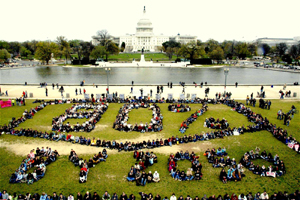
From November 2 to November 5, young from all over the country will gather in Washington, D.C. for Power Shift, "the first national youth summit to solve the climate crisis." The conference will be held at the University of Maryland in College Park, Maryland. Included in the agenda are workshops, panels, performances, a green job fair, and a lobby and rally day on Capitol Hill. At the summit, youth will meet in groups based on geography, building networks and learning how to carry home the lessons learned and begin action. On November 3, the conference will coordinate with a national Step It Up day, an opportunity for individuals across the country to organize actions that suit their communities, like clean-ups. You can sign up for Step It Up online and send in pictures after the event to be compiled and sent to Congress. Registration for Power Shift can be found on the website. Registration ends on October 31. As of this writing, 4,701 youth leaders are registered. It will be an opportunity for youth to share their vision of a future--and a present--of vitality, progress, and innovation. Joining voices, youth will unify and share their message of a healthy future that only a clean planet can provide.
New Moon recently caught up with twenty-year-old Shadia Wood, one of Power Shift's spokespeople and organizers. She began her activism early, and it has continued as a passion throughout her life so far. Her position just shifted from youngest Campus Climate Challenge Coordinator for the Energy Action Coalition (the organizers of Power Shift) to working for Power Shift directly on travel scholarships for youth of color and low-income youth. Here are some highlights from our interview. Stay tuned for a later post to read more of the interview and learn more about Shadia (like the first press conference she attended at two)!
New Moon: How long has [Power Shift] been in the making?
 Shadia Wood: That’s such an interesting question… When we created our three-year campaign plan for the Campus Climate Challenge, which is the Energy Action Coalition’s main campaign, we always knew that we were going to be putting on a national conference at some point. We thought it was going to be the third year. We realized that [at] the rate we were going in year one, we were going to hit a lot of our goals and surpass them by so much. Because the movement and the issue is so on right now, and it’s very apparent, like California is on fire right now. There are so many glaring instances of global warming that across the country we were just hitting our goals and surpassing a lot of them. So we decided that it was actually year two that we needed to have a national convergence on global warming. We kind of figured that out last January. The actual planning—I don’t recommend this for anyone who does want to put on a conference of five thousand young people—took place in about four months… about four or five months. That is a headache and it causes a lot of heartache and it causes a lot of miscommunication, so I don’t recommend that at all, but it is coming together, and it does feel really, really good and exciting. It feels amazing that this is finally happening, and I can’t believe we’re a week away from the conference [at the time of the interview]. Make sure you plan your conferences well in advance.
Shadia Wood: That’s such an interesting question… When we created our three-year campaign plan for the Campus Climate Challenge, which is the Energy Action Coalition’s main campaign, we always knew that we were going to be putting on a national conference at some point. We thought it was going to be the third year. We realized that [at] the rate we were going in year one, we were going to hit a lot of our goals and surpass them by so much. Because the movement and the issue is so on right now, and it’s very apparent, like California is on fire right now. There are so many glaring instances of global warming that across the country we were just hitting our goals and surpassing a lot of them. So we decided that it was actually year two that we needed to have a national convergence on global warming. We kind of figured that out last January. The actual planning—I don’t recommend this for anyone who does want to put on a conference of five thousand young people—took place in about four months… about four or five months. That is a headache and it causes a lot of heartache and it causes a lot of miscommunication, so I don’t recommend that at all, but it is coming together, and it does feel really, really good and exciting. It feels amazing that this is finally happening, and I can’t believe we’re a week away from the conference [at the time of the interview]. Make sure you plan your conferences well in advance.The Power Shift's official three goals are to make the U.S. presidential candidates and Congress take global warming seriously, to empower a diverse network of leaders, and to achieve broad geographic diversity. What single political action do you personally think would the most difference for the environment right now?
That’s a really good question. The Energy Action Coalition as a whole is pushing the 1Sky Initiative…It’s not a policy, but it’s a policy ask. It’s probably the boldest thing we have out around global warming…Basically what the 1Sky does is it’s teaming up with a bunch of different organizations and coalitions to make sure that we’re asking for the right priorities to be taken. One of those things things, which is the biggest priority, is to mobilize America for solutions, and that creates five million new jobs. They’re trying to launch a green jobs corps. So basically it’s, “How are we helping people who have these industry jobs who aren’t making a lot of money but who are living off of these industry jobs and they’re providing for their family and that’s what they have?” So it’s, “How are we jumping the gun so we’re not in a situation where these people who are low-income are behind and they’re not trained in these new green jobs that are emerging? How do we capitalize on that and make sure that we’re making a safe space for these workers?”
Another [priority] is to secure our future. That is around the emissions reductions, cutting at least eighty percent of below-1990 levels by 2050. That also has benchmark goals, because you can’t just say, “By 2050 you probably should cut around eighty percent.”
And then we have transform our energy priorities, which is reprogramming fossil fuel and highway investments for clean energy choices, so starting with a firm moratorium on coal plants. That is something that the Energy Action Coalition was pushing heavily for—no new coal in general and no coal in general. So it’s pushing for these bold asks.
So that’s our place at the table, Energy Action and youth, is making sure that these policies that are emerging are bold and are asking for things aren’t what’s happening with these other policies like Lieberman and Warner. Making sure that these policies are actually going to be impacting everyone positively, especially low-income and people of color.
What do you think the highlights [of Power Shift] are going to be? What are you most looking forward to?
There are a couple different ones. The more informal ones are how it starts out—everyone’s going to these workshops, and they’re getting all excited, and they’re loading their brains up with all this knowledge, and they’re kind of overwhelmed and psyched at the same time, getting really inspired. And it’s the conversations afterwards, like when you’re going home at night and your brain is swarming, and you’re like, “Oh my God what do we do?” and you have a bunch of youth with you already—you have [about] forty youth leaders maybe in your group—and you sit down and you’re talking. And you are creating state networks, and it’s these initial conversations where things get started, which is so inspiring to me. Energy Action was created after a regional summit in the southeast on someone’s dorm bed, the idea of creating a coalition like Energy Action. So it’s those types of conversations that are really inspiring to me. Those are the highlights, those are the behind-the-scenes things.
Then also there’s also the lobby day and the DC rally, which is going to be really, really exciting. We’ll be on the capital, have a few speakers, and then we’re also going to be hitting up our representatives and pushing for these bold asks. That’s always really exciting to me, especially because I did a lobby campaign for eight years. It’s good to see people out in the streets and doing that.
What is the next step after Power Shift?
The next step is to go back to your homes and your communities, and take it there. It’s taking those skills and inspiration back to your community. Taking those networks that you built and creating something that can have a local impact. You can share those stories.
Thanks, Shadia! As I said, stay tuned for more of our interview. In the meantime, here are some more links to check out:
http://youtube.com/watch?v=BuXXqEmPfWA
http://climatechallenge.org
Girls, your voices make a difference, and it's all about what you have to say. What's your passion?
Signing off, Bissy (Elizabeth!)




3 comments:
Great YouTube video! I'm so excited that young people are making this happen. You girls rock!
My exchange student is going to d.c. to participate in this. She wants to do more, but she is applying for her visa and doesnt want to get in trouble
kool! this rocks!
thanks!
Post a Comment